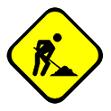Journey: Terrain
Here, we talk about terrain.
Contents
Terrain
Terrain plays an important role in Journey. Not only does it provide the backdrop for the PCs, it also informs many important aspects of Journey gameplay, such as economics, travel, and item and resource availability.
Basics
The worldmap of a Journey setting is divided into hexagons. While tactical maps use squares, hexagons allow for more natural shapes in terrain, and also avoid the issue of corners, which are somewhat nonsensical when talking about terrain.
The default assumption is that a hexagon is 10 miles across, and thus it is 5 miles from the center of a hex to a corner and slightly less to the mid-point of an edge. However, you may want to change this default assumption. Given that, we use a generic measurement for hexes; a wheel is the length of one side of a hex, which is conveniently also the distance from a hex's corner to its center. Thus, in wheels, a hex is 2 wheels across from corner to corner.
While you can change the default assumption of the basic distance of a hex, it is recommended that you read this section and understand the implications of doing so. If the distance is shorter, the multipliers on yield values of resources from hexes based upon distance from nearest settlement should be modified to reflect that; if the distance is longer, the opposite is true.
Types of Terrain
It is surprisingly difficult to come to a simple, easy-to-use categorization of terrain. Earth is a ridiculously varied place, and attempting to classify the terrain there is not a simple task.
There are three levels to a terrain hex: the base terrain, terrain modifiers, and terrain resources. A given hex can only possess one base terrain. Certain terrain modifiers can co-exist in a hex. A hex can possess a theoretically unlimited number of resources.
Base Terrains
The base terrains are as follows.
- Tundra
- Desert
- Mountain
- Hills
- Plains
- Wetlands
- Coast
- Ocean
Terrain Modifiers
Terrain modifiers come in two varieties - natural and artificial.
- Natural
- Forest
- Jungle
Resources
There are theoretically lots of resources available. We'll start with some basic ones, and see where we go from there...
- Copper
It is also entirely possible that we're going about this all wrong - ie, a "forest" is just a modification to a previously-existing terrain type.
Resources and Yields
Most terrains have some sort of resource that can be offered. Forests offer wood; mountains offer ore; plains offer food (or at least the possibility thereof). These are collectively called resources.
Each terrain hex then also has, for each of its resources, a yield. This is the amount of the resource that can be reliably gained from the hex in a set amount of time, with the default assumption being one week.
The default yield of a resource in a hex is a set value; once determined, it generally doesn't change, barring catastrophe or massive intervention (for instance, a forest that burns down would no longer yield wood).
Settlements
...the journey of a thousand miles...
|
Journey
|
...begins beneath your feet...
| |||||||||||||||||||||||||
|---|---|---|---|---|---|---|---|---|---|---|---|---|---|---|---|---|---|---|---|---|---|---|---|---|---|---|---|
| |||||||||||||||||||||||||||


